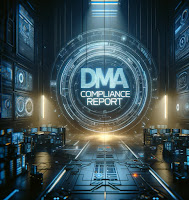Podcast here.
@WavesBlog
A self-proclaimed essential facility.
Friday, May 03, 2024
Thursday, April 25, 2024
Wednesday, April 24, 2024
Monday, April 22, 2024
EU Data Summit of the Konrad Adenauer Stiftung: Always learning something new and unexpected
Programme, here.
Recordings:
Day 1 here.
Day 2 here.
(Study mentioned during the "Level Playing Field in Accessing Vehicle Data?" here, BTW).
Day 3 here.
Second time that I participate in person, the other 4 editions I followed online (and I hereby gratefully acknowledge that I normally use the summit's recordings also as teaching material for my courses).
This time I participated in a transatlantic panel on antitrust (as a humble researcher and observer, I didn't have perhaps tons to say - apart from talking of saffron risotto - but the other two Panelists did - worth watching for their comments and the excellent questions by Samuel Stolton). But I also had a fun dual role as a moderator of a truly insightful DMA panel (first time I moderated a panel - and it showed - but, luckily, my great Panelists didn't need me at all!).2024 Antitrust and Competition Conference
Day one, video here.
How Much Does Antitrust Enforcement Affect Productivity Growth? (8:23)Case Studies: AT&T & IBM (2:07:25)
The Quest for Next: How Antitrust Shapes Competition and Innovation in Computers and Chips (3:45:17)
Case Study: Microsoft (4:48:19)
Case Study: Google (6:11:24)
The End of the Beginning for the Antimonopoly Movement? (7:33:50)
Day two, video here.
Regulatory Competition, the DMA and Innovation (14:05)How (Not) To Regulate AI: Challenges and Opportunities (1:50:54)
The Proper Role of Economics in Merger Review (3:34:20)
Privacy, Property Rights and the Diffusion of AI (4:52:29)
This Conference is NOT Funded by Big Tech (6:20:55)
Sunday, April 14, 2024
The Forgotten Anti-Monopoly Law: The Second Half of Clayton Act § 7
R. Lande, J. Newman, R. Kelly Slaughter, here.
Alternative browsers report uplift after EU’s DMA choice screen mandate
Natasha The Great and I. Mehta, here.
Wednesday, April 10, 2024
Tuesday, April 09, 2024
The DMA in Action: Early Effects and Global Reach
ITIF (supported by all DMA gategeepers but Bytedance - as well as Boeing, the national champion), video will be here.
Saturday, April 06, 2024
'Super Apps' and the Digital Markets Act
Short piece 'invited' by a Journal, preprint here.
Notate Bene: written before the DOJ v. Apple Complaint was filed ;-).
Not a ‘side dish’: New industrial policy and competition
C. Caffarra and N. Lane, here.
BTW: CC blocked me on X because she finds me and/or my views annoying. No hard feelings, her views will always be welcome on this blog!
Friday, April 05, 2024
Friday, March 29, 2024
Antitrust Law in California: 'objective' reports on the topics addressed by experts
California Law Revision Committee, Here.
Thursday, March 28, 2024
Tuesday, March 26, 2024
Tuesday, March 19, 2024
Friday, March 15, 2024
Tuesday, March 12, 2024
Monday, March 11, 2024
Friday, March 08, 2024
‘Super-apps’ and the Digital Markets Act
Abstract
The Digital Markets Act (DMA) aims to ensure
contestability and fairness in digital markets, particularly focusing on
regulating Big Tech companies. The paper explores the DMA's capacity to address
both current and future challenges in digital market contestability and
fairness, spotlighting the trend towards platform integration and the potential
rise of "super-apps" akin to WeChat and KakaoTalk. Specifically, it
investigates WhatsApp, owned by Meta, as a gatekeeper that might expand its
service offerings, integrating additional functionalities like AI and metaverse
technologies. The paper discusses whether the DMA's obligations, such as mandated
interoperability and data portability, can mitigate the emergent risks to
market fairness and contestability from such integrations. Despite recognizing
that the DMA has the potential to address many issues arising from platform
integration, it suggests the necessity for adaptability and a complementary
relationship with traditional antitrust law to ensure sustained contestability
and fairness in evolving digital marketsThursday, March 07, 2024
Thursday, February 29, 2024
Wednesday, February 28, 2024
Digital Platforms, Competition Law, and Regulation: Comparative Perspectives
Open access book with many goodies, here.
Monday, February 26, 2024
DMA Compliance workshops
18 March : Apple
19 March : Meta
20 March : Amazon21 March : Alphabet
22 March : ByteDance
26 March : Microsoft
Friday, February 23, 2024
Monday, February 19, 2024
Tuesday, February 13, 2024
Friday, February 09, 2024
Wednesday, February 07, 2024
Launch of the GW Competition & Innovation Lab
Video here.
NB: None of the academic economists mentioned that they worked for consultancies - eg Richard Gilbert for Compass Lexecon.
Interesting to see Hans Zeng (EC) there too.
Who’s financing the whole initiative isn’t mentioned on the website. I guess no private donors then (?). The “other” dynamic competition initiative hosted in Florence is instead openly financed (also) by a consultancy.
Letter: Europe has an unrivalled record on antitrust
O. Guersent, here.
The article has ruffled some feathers, while others of a similar tone have passed unnoticed. It is true, as BEUC writes, the "EU’s guiding principle has been to uphold a competition enforcement standard based on broader values including consumer choice, innovation and quality rather than simply price". However, it must also be acknowledged that in the EU the more economic approach with a very strong "industrial organization flavour" and its laser focus on prices and models (along with the array of consultancies it brings along) remains fairly dominant and has not been directly challenged from a theoretical standpoint as is happening in the US.Tuesday, February 06, 2024
Tuesday, January 30, 2024
Monday, January 29, 2024
Wednesday, December 13, 2023
#DMACountdown
Tuesday, December 12, 2023
Protection des données et concurrence : une ambition commune
Monday, December 11, 2023
Competition and Innovation: Incorporating a More Dynamic Perspective into Enforcement
This is the text of my 15-minute intervention last week at the OECD. Happy I wrote it down and read it because I was a bit overwhelmed, to be honest. Accompanying slides here.
The best part, however, was the interaction we had with the OECD States/competition authorities (despite sitting very far from each other).
"Thank you immensely to the Chair and the Committee for the opportunity to be here with you today. I think that we all in this room might agree that the interplay between competition and innovation is increasingly vital in our economies, in which we all face numerous challenges in devising solutions to ever more complex problems.
These challenges
are starkly highlighted by the ongoing issues surrounding climate change and
the digital revolution. As we know, innovation can be the creative response
that entrepreneurs make to changing conditions, to new challenges. To these
entrepreneurs, “innovation is the ability to see change as an opportunity - not
a threat.” And we as a society, as consumers are provided with choices on how
to deal with these challenges, with these changing conditions. Furthermore, the
critical role of innovation has been profoundly illustrated in our emergence
from the health crisis brought about by COVID-19.
In competition policy circles like this one here, innovation
isn't just a buzzword we throw around to sound smart while prices and output is
what antitrust law is really about. There is a profound and increasing
recognition that innovation is a real
factor in shaping competitive processes and often it should be taken even more
seriously than price effects in competition policy enforcement.
We are very lucky here today to stand on the shoulders of
this excellent background paper prepared by the OECD Secretariat. In my brief
remarks today, I will focus primarily on the highly useful distinction between
the approach that focuses on innovation incentives and the approach that
instead focuses on the innovation impact or innovation effects.
The clear
distinction drawn between a more static and a more dynamic perspective on
innovation is particularly commendable and useful. It effectively highlights
the progress made in terms of competition policy so far, as well as what
remains to be done, both from a theoretical standpoint and in terms of competition
policy enforcement.
Both approaches
have their merits and limitations, and in a certain sense, they are
complementary to each other. Understanding which approach to adopt depends on
the crucial assessment by competition authorities of how competition manifests
itself in the specific market, sector, or industry at stake.
Is the focus on
current or potential competition in identified product markets or is the focus
directly on innovation processes or spaces? This differentiation, as I see it,
is the real focal point of the background paper, from which the brief
considerations I will present in the following emerge.
Although this
differentiation is absolutely crucial and we will return to it shortly, I
believe the two approaches are driven by many insights that are common to both.
I will mention three of these insights here.
The first is the belief
that it is possible for competition enforcers to identify situations, markets in which
innovation is a significant dimension of rivalry between companies.
The second is that
a longer-term or dynamic perspective is necessary to fully grasp innovation and
its relationship with competition.
The third
realization or insight is that a longer-term perspective must contend with
uncertainty. Here we must decidedly forego the comfort of quantifications that
offer the illusion of certainty in the application of antitrust law.
I've created a
table, informed by the background paper and my previous research on this topic.
It outlines key differences between the two approaches, in addition to the
shared insights I've just mentioned.
The first approach
focuses on the circumstance that rivalry in the product market is driven by
product or process innovation. The second approach, on the other hand, brings
directly to the fore the innovation efforts made by competing firms.Top of Form
This is clearly
evident from the background paper, to which I would only like to add the idea
that it is necessary to also consider the ecosystems where the relative orchestrators
appropriate and manage the innovation efforts produced by the ecosystem
participants.
The following point
relates to the realization that the innovation concerns in the two approaches
are distinct. On one side, there is a reduction or delay in introducing new
features in a product market. On the other, there's a more direct concern
regarding changes to innovation levels and intensity.
The third point is
a focus on financial incentives to innovate by the first approach and on capabilities to innovate in the second.
The fourth point is
that, according to the first approach, future markets can be identified in a
traditional manner. In contrast, based on the second approach, it is not
possible to define markets that may emerge from innovation in such conventional
terms.
The fifth aspect is
that for the first approach, innovation is mostly of an incremental nature,
while the second approach is perhaps more oriented towards innovation that is
mostly of a disruptive nature.
The sixth aspect
relates to different degrees of uncertainty. For the first approach,
uncertainty is linked to the fact that products have not yet entered the market
or potential outcomes from innovation are not clearly identifiable. For the
second, the uncertainty is more radical as it stems from the circumstance that
there is high uncertainty regarding future outcomes of innovation efforts.
The seventh and
final aspect concerns theories of harm. For the first approach,
profit-cannibalization narratives are particularly relevant, thus analogous to
unilateral price effects. Relevant are also traditional foreclosure theories,
which are then adapted to an innovation context. Instead, For the impact-based
approach to innovation and competition, the theories of harm aim to highlight
the direct impact on innovation of a behaviour or a transaction, not merely as a
consequence of a reduction in competition.
Certainly, the
distinction between these two approaches is valuable for analytical clarity and
for promoting theoretical and other developments, but in enforcement practice,
they are often also strategically interconnected, as noted in the background
document.
So, we can
distinguish cases where there is a more static approach to innovation and which
aligns closely with the first approach. This involves determining product
markets, even if they are in the future, even if the competition is only
potential, and then also relying on conventional theories of harm based for
instance on a profit cannibalization rationale.
And then there are
other cases where the approach to competition is more dynamic, both in terms of
determining a product market or an innovation space and in terms of theories of
harm.
In the final part
of my reflection, I concentrate on some challenges that I still see on the
horizon from the perspective of further developing this more dynamic approach
to innovation.
From seven, as in
the previous table, the points I would like to briefly illustrate are now eight.
The first point is
that it seems to me that it’s still necessary to better conceptualize the
relevant rivalry between companies as a process of innovation and knowledge
creation. From this perspective, it is clear that the traditional, orthodox
industrial organization thinking and approaches may provide only limited
assistance. Much more useful could be economic theories that focus on
innovative, dynamic processes of variation and selection, such as evolutionary
economics.
I am absolutely
convinced that these alternative economic conceptualizations of dynamism and
competition processes should receive greater attention from antitrust
enforcers. The monopolization carried out by the industrial organization in the
field of so-called competition economics has so far left little room for this and
other theoretical contenders or even disruptors to emerge.
The second point is
that there is still a significant need to develop a better understanding of
innovation capabilities, especially in sectors where innovation processes are
less structured. This might be the case because, for instance, the tools of
appropriation in theses sectors or market phases might be different from
traditional IP rights. A different understanding of innovation capabilities
might be required based on the specific type of technology/knowledge
production, the specific skills required (for instance, particularly valuable
AI talent), and the specialized assets needed, such as data and specific
technological tools required for innovation.
The third point is
that if a better understanding of innovation capabilities is essential, there
are additional innovation factors beyond capabilities that require attention.
These include dynamic patterns, path dependencies, absorptive capacities, technological
trajectories, and so on.
The fourth point is
that greater efforts may be needed in certain contexts to assess the impact of the
same innovation efforts on multiple sectors (e.g., digital) – cross-market.
A fifth, more
practical challenge is that in some jurisdictions, it may be necessary to
clarify in the law that "market definition" under certain
circumstances is not necessary, or that the market can be determined in a
radically different manner from traditionally employed methods.
A sixth, more
challenging point from a theoretical and analytical perspective is that it
seems necessary to better understand innovation processes within ecosystems.
This, for instance, requires differentiation between the production of
innovation and knowledge and the mechanisms of their appropriation. This
pertains to contexts and ecosystems where both incremental and disruptive
innovation hold significance.
A seventh point to
consider is that it would be important to incorporate concerns about the
"quality" of innovation into antitrust practice, not just focusing on
innovation levels and intensity. From this perspective, close collaboration
with data protection authorities and, in the near future, various types of AI
regulators, including sector-specific ones, could be crucial.
Last but not least,
there is the challenge related to the evidence required to ultimately capture
the innovation dimensions mentioned in the background note. Some are already
practiced, such as portfolios of R&D activities, commercial and licensing agreements
with other companies. Other evidence, for example, to assess innovation
capability, may include the analysis of links to universities, participation in
scientific conferences, and so on.Top
of Form
If the eight
challenges, taken together, may seem a bit daunting, I would suggest that
antitrust authorities join forces on many common fronts. A very practical and
cost-effective suggestion is that one or more antitrust authorities, from
different jurisdictions, could facilitate the organization of symposia,
seminars, and workshops that bring together economists (including those from
non-orthodox economic schools), management experts, behavioural scientists, scientists
from different fields, and technologists. These gatherings would provide a
platform for cross-disciplinary collaboration, offering diverse perspectives,
approaches, and knowledge to enhance the understanding of innovation processes
within specific industries and sectors. They could ideally also lead to the
development of new assessment tools and methodologies immediately relevant to
competition policy enforcement.
-
Ofcom.org.uk, here .
-
G. Soros, here.
-
LG Frankfurt am Main, 2-06 O 172/09 (verkündet am 13.05.2009). Lesenswertes aus der Begründung (meine Hervorhebungen): "Vorstellbare ...
-
EnGadget, here . Qualcomm's Answer and Counterclaims here .
-
T. McSweeny, here.
-
Los Angeles Times, here .
-
Technology Review, here .
-
Deutscher Bundestag, hier . S. auch Entschließungsantrag der Grünen, hier .




.png)
















.jpeg)

